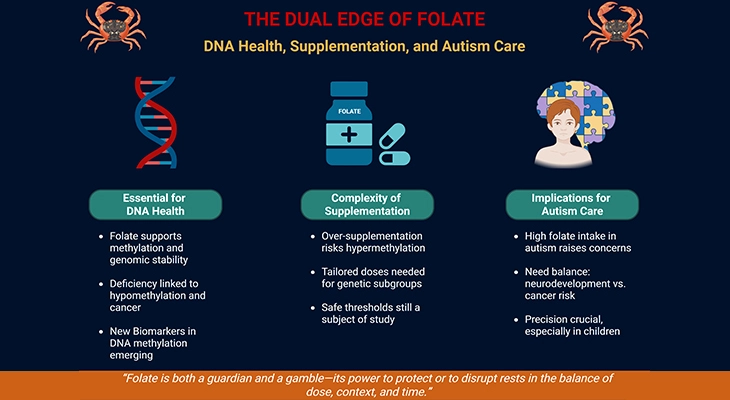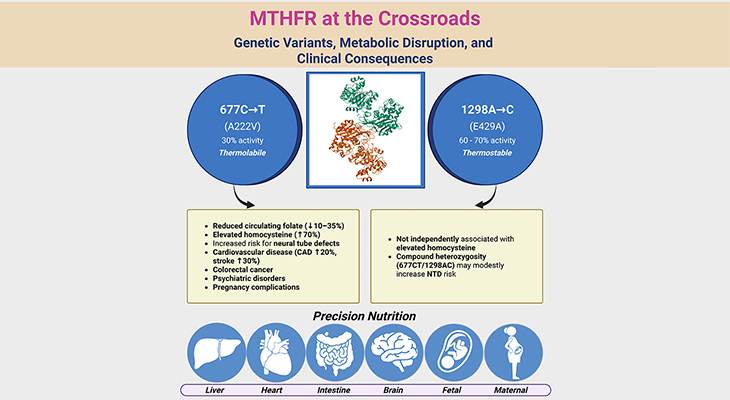Table of Contents
- Introduction
- Perspectives on Depression Diagnosis
- The Effectiveness of Antidepressants: A Complex Debate
- Comparing Psychological Therapies for Depression
- Exploring Complementary and Alternative Therapies for Depression
- Future Developments in Depression Medications
- Take-Home Messages
- Summary and Conclusions
- Did You Know About Folate Receptor Autoantibodies (FRAAs) and Brain Development?
- References
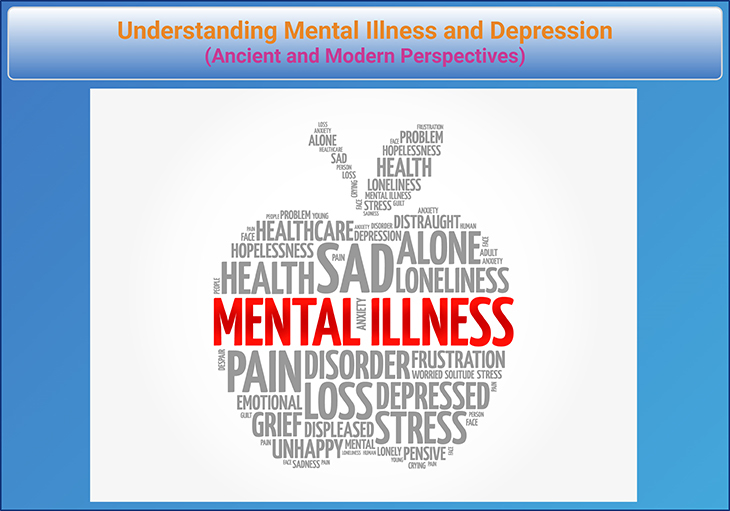
Figure 1. Understanding Mental Illness and Depression: Ancient and Modern Perspectives. Mental illness encompasses a wide range of conditions that affect mood, thinking, and behavior. These can include anxiety disorders, schizophrenia, bipolar disorder, and depression, among others. Depression, in particular, is a common mental health issue characterized by persistent sadness, loss of interest in activities, and various emotional and physical problems. Ancient Perspectives: In ancient times, mental illnesses were often misunderstood and attributed to supernatural forces or divine punishment. For instance, the ancient Greeks and Romans believed that mental disturbances were caused by imbalances in bodily fluids called humors. Treatments included balancing these humors through diet, bloodletting, and herbal remedies. Modern Perspectives: Today, we have a more scientific understanding of mental illnesses, recognizing them as medical conditions that can be diagnosed and treated. Depression is understood to result from a combination of genetic, biological, environmental, and psychological factors. Modern treatments include psychotherapy (such as cognitive-behavioral therapy), medications (like SSRIs and SNRIs), and lifestyle changes. While ancient approaches to mental health were rooted in mysticism and rudimentary medical practices, modern perspectives emphasize evidence-based treatments and a compassionate understanding of mental health issues. This evolution reflects our growing knowledge and changing attitudes toward mental illness, paving the way for better support and care for those affected. I hope this overview helps you grasp the journey of understanding mental illness and depression from ancient to modern times.
Introduction
Depression is a pervasive and often misunderstood mental health condition that affects millions of people worldwide. From ancient times to the present day, our understanding of depression and its treatments has evolved significantly (see Figure 1). As we continue to make strides in diagnosing and managing this complex condition, it is essential to explore the various facets of depression, including the effectiveness of antidepressants, psychological therapies, complementary and alternative treatments, and future developments in medications [1].
In this blog, we will delve into the science behind depression and examine the range of treatment options available today. We will also highlight ongoing research and emerging therapies that promise to shape the future of depression care. Whether you are seeking information for yourself or a loved one, or simply looking to expand your knowledge, this comprehensive guide aims to provide valuable insights into the multifaceted world of depression and its treatment.
Perspectives on Depression Diagnosis
Depression is a topic that sparks a wide range of opinions. Some people think it is diagnosed too often, while others see it as a normal response to life’s challenges that should not be treated with medication. There are also those who acknowledge depression as a real disorder but disagree on how it should be treated.
It is remarkable that a consistent picture of depression has been identified across history, i.e., in every type of recording that man has ever made. However, some notable figures, like Thomas Szasz, argue that depression does not exist. The current debate is not about the existence of depression but rather how it is classified, diagnosed, and treated. There are many theories about what causes depression, and attitudes toward treatment vary greatly [2].
Interestingly, studies that claim depression is over-diagnosed and antidepressants are overprescribed are balanced by studies suggesting depression is under-diagnosed and under-treated. This contradictory evidence suggests that depression is often misdiagnosed and mistreated. For example, some people receive antidepressants for temporary unhappiness or symptoms unlikely to benefit from medication. On the other hand, many elderly people with depression remain untreated because it is seen as a natural part of aging and having physical ailments. This is puzzling because doctors do not withhold treatment for other common conditions like diabetes in older adults.
Experts in depression agree that even if we get better at diagnosing it accurately, questions will still remain about the best treatments for individuals, given the various causes and levels of severity or complexity of the disorder.
What do you think about these different perspectives on depression diagnosis?
The Effectiveness of Antidepressants: A Complex Debate
The effectiveness of antidepressants has been debated ever since tricyclic antidepressants were introduced (see Figure 2 and 3). Reviews of scientific studies often present contradictory findings. Some claim that antidepressants are effective, while others argue they work no better than a placebo (like a sugar pill).
The debate intensified in 2008 when Dr. Irvine Kirsch from Harvard Medical School published a review suggesting that antidepressants offer minimal benefit for treating depression. Unlike previous reviews, Kirsch and his colleagues accessed all clinical trials submitted to the Food and Drug Administration (FDA) using the Freedom of Information Act. This allowed them to include both published studies showing the drugs’ effectiveness and unpublished ones showing no benefit.
The controversy lies in interpreting these findings. Scientifically, antidepressants help about 60-70% of users, whereas placebos help 30-50%. So, in absolute terms about 20% more people benefit from antidepressants compared to placebos, . However, there are key points to consider:
- Individuals with severe depression see clear benefits from antidepressants, but the benefits for mild and moderate cases are less consistent. Some studies found benefits, while others did not.
- Most studies were short-term, lasting about six weeks, whereas real-world prescriptions often span longer periods.
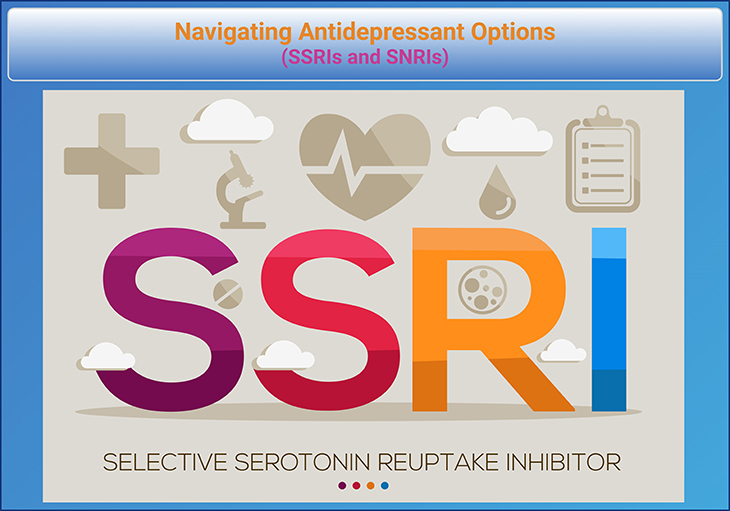
Figure 2. Navigating Antidepressant Options: SSRIs and SNRIs. SSRIs (Selective Serotonin Reuptake Inhibitors) and SNRIs (Serotonin-Norepinephrine Reuptake Inhibitors) are two types of antidepressants that help many people manage depression and anxiety. SSRIs, such as Prozac (fluoxetine), Zoloft (sertraline), and Lexapro (escitalopram), are popular because they’re generally safe with fewer side effects, though they can still cause nausea, headaches, and sleep problems. It can take a few weeks to feel their full effects, and stopping them suddenly might lead to withdrawal symptoms. On the other hand, SNRIs like Effexor (venlafaxine) and Cymbalta (duloxetine) not only target serotonin but also norepinephrine, making them useful for treating depression, anxiety, and chronic pain. Like SSRIs, they come with side effects and potential withdrawal issues. While neither type of medication works for everyone, and each has its pros and cons, they offer valuable options for those battling these challenging conditions. Always consult with a healthcare provider to determine which option might be best for you [3].
Four key observations about antidepressant prescriptions and benefits:
- There is progress in transparency, with drug trial data now available online, allowing independent researchers to verify findings. This is crucial since antidepressants are one of the most prescribed medications globally, and trust in pharmaceutical information is essential.
- Similar to antidepressants, many physical disorder treatments, like anti-inflammatory drugs, show a 20% difference between active medication and placebo. Despite this, people continue to use them, and doctors prescribe them, targeting those who benefit most.
- Many cancer treatments work only for specific patient subgroups and often offer short-lived improvements. It is unrealistic to expect one class of drugs to work equally well for everyone with depression. We need to tailor treatments and find predictors for the best approach.
- While some mild-to-moderate depression cases benefit from antidepressants, those with severe depression consistently benefit the most. Unfortunately, many prescriptions are for less severe cases, which are least likely to benefit. This contributes to the ongoing debate about antidepressants’ effectiveness.
Where do you stand on this discussion about the effectiveness of antidepressants?
Comparing Psychological Therapies for Depression
The effectiveness of different psychological therapies for depression is a hotly debated topic. While counseling can be helpful in the short term, especially for those lacking social support, its benefits often diminish within 3-6 months after the sessions end. For long-term gains and prevention of future depressive episodes, therapies that teach people new coping mechanisms and behaviors might be preferred. Repeating counseling sessions can be costly, and the economic argument for therapy holds only if it leads to fewer relapses and a better quality of life compared to medication or a combination of both.
Different therapies like CBT (Cognitive Behavioral Therapy), behavioral activation, IPT (Interpersonal Therapy), and family therapy all have their proponents [4]. However, they often share core elements such as building a positive therapist-client relationship, creating a therapy plan, and engaging in active problem-solving. Because of these overlaps, it can be challenging to argue that one therapy is significantly better than another. Predicting who will respond best to each therapy (aside from symptom severity and personal preference) also remains difficult.
Proving the short-term and long-term benefits of a therapy across various patient groups and cultural contexts takes time. For instance, while mindfulness has gained popularity, by the end of 2015, fewer than twenty high-quality studies had investigated its use in adults with depression, most involving fewer than 100 participants. While the results are promising, it’s hard to justify changing international treatment guidelines based on limited research involving around 2,000 mainly European and American patients.
“What are your thoughts on the effectiveness of different psychological therapies for depression?”
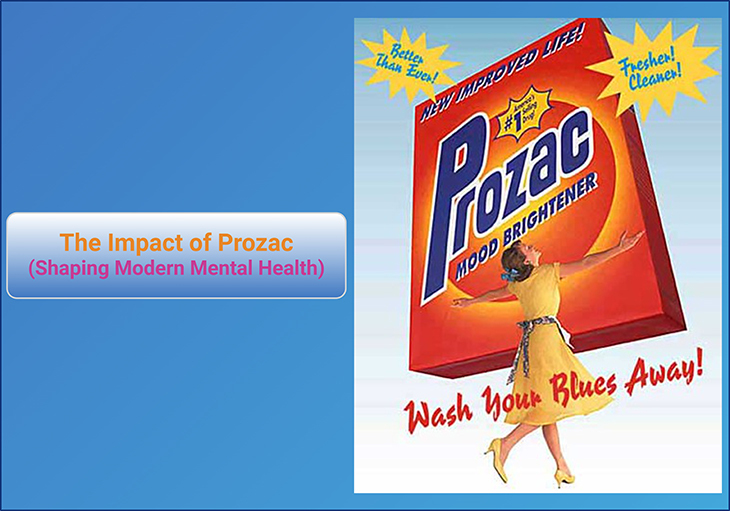
Figure 3. The Impact of Prozac: Shaping Modern Mental Health. Prozac, also known by its generic name fluoxetine, is often considered a game-changer in the world of mental health. Introduced in the late 1980s, Prozac quickly became one of the most well-known and widely prescribed antidepressants. Its arrival marked a significant shift in how depression and other mental health conditions were treated. Unlike older antidepressants, Prozac was praised for its relatively mild side effects and effectiveness in treating depression, anxiety, and obsessive-compulsive disorder. Its influence extended beyond the medical community, making its way into popular culture. Books, movies, and TV shows frequently referenced Prozac, reflecting its impact on society’s understanding and acceptance of mental health treatment. The term “Prozac Nation,” popularized by Elizabeth Wurtzel’s memoir, became synonymous with a generation increasingly open about their struggles with mental health. Prozac helped destigmatize antidepressant use and highlighted the importance of seeking help for mental health issues. While Prozac is not a miracle cure and may not work for everyone, it has played a crucial role in advancing mental health awareness and treatment, paving the way for new medications and therapies. I hope this brief overview gives you a sense of Prozac’s significance in the media and its role in modern mental health.
Exploring Complementary and Alternative Therapies for Depression
Depression is one of the top reasons people seek out complementary or alternative therapies, which cover a wide range of treatments like herbal medicines, acupuncture, reiki, and exercise (see figure 4). Many turn to these alternatives either because they are dissatisfied with conventional treatments or because these methods align more with their personal health beliefs.
For instance, homeopathy offers a personalized approach that focuses on treating the whole person, which some people feel is missing from mainstream medicine. However, it is important to note that in 2010, the UK House of Commons Science and Technology Committee found no reliable evidence that homeopathy is more effective than a placebo.
People often believe that natural remedies are inherently safe, but this is not always true. Herbal remedies are not regulated like conventional drugs, leading to inconsistencies in dosage and potency. For example, St. John’s Wort (SJW), derived from the Hypericum plant, has been used as an antidepressant. While it may help with mild depression, it can interfere with other medications, like reducing the effectiveness of oral contraceptives and iron absorption.
One promising alternative therapy that is gaining mainstream acceptance is exercise. Public health campaigns promote exercise for its overall health benefits, and research shows it can improve symptoms of depression. Indeed, public health campaigns are actively promoting the need to get people ‘off the sofa’ with slogans such as “sitting is the new smoking.” Exercise seems to be most beneficial for those with mild depression. Severely depressed individuals might struggle to start an exercise regimen without initial medical treatment. Exercise can help distract from negative thoughts, boost self-esteem, and improve social connections. Physiologically, it may also alter endorphin levels and reduce cortisol, potentially reversing some biological changes linked to depression.
What are your thoughts on the effectiveness of complementary and alternative therapies for depression?
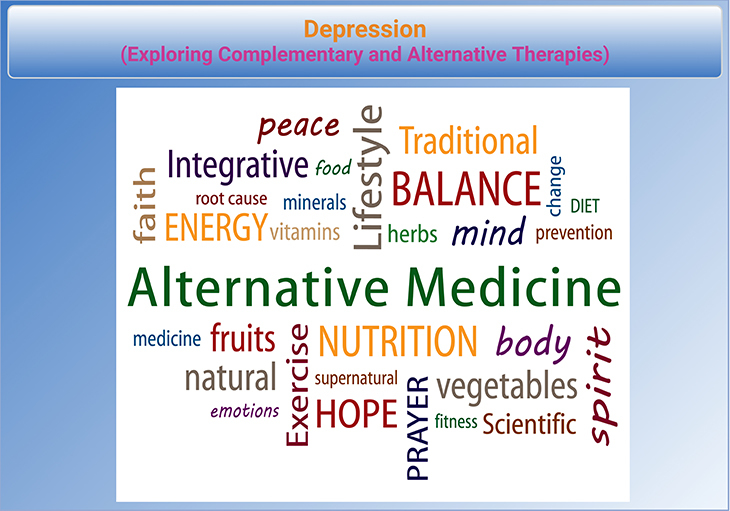
Figure 4. Complementary and Alternative Therapies: Exploring Their Role in Treating Depression.
Complementary and alternative therapies (CAM) are treatments used alongside or instead of conventional medicine. These therapies include herbal medicines, acupuncture, yoga, and exercise, among others. People often turn to CAM due to dissatisfaction with conventional treatments or because these methods align better with their personal health beliefs. Scientific research on CAM for depression shows mixed results. For example, St. John’s Wort, a popular herbal remedy, has shown some benefits for mild-to-moderate depression, but its effectiveness is not definitive, and it can interact with other medications. Omega-3 fatty acids have shown small benefits in some studies, but more research is needed to confirm their effectiveness. Acupuncture has also shown modest benefits for depression compared to no treatment. Exercise is one complementary therapy with strong scientific backing, particularly for mild depression. It offers physical and psychological benefits, helping to improve mood, reduce negative thoughts, and boost self-esteem. While some CAM therapies show promise, it’s important to consult healthcare professionals and consider scientific evidence before using these treatments. Always discuss any CAM therapies with your doctor to ensure they are safe and appropriate for your situation.
Future Developments in Depression Medications
There are still gaps in our understanding of depression and some dissatisfaction with the medications currently available to treat it. Psychiatry, like the rest of medicine, continuously evolves, exploring new theories on how depression develops and identifying those at risk. In the late 20th century, researchers discovered connections between the monoamine and stress hormone systems, noting their bidirectional influences with genetic, psychological, and environmental factors.
In recent years, attention has shifted to the links between these systems and the circadian and immune systems. While a detailed discussion is beyond the scope of this blog, a few key areas of new research offer hope for discovering much-needed treatments. These developments aim to improve our understanding of depression and ultimately lead to more effective medications for those who need them.
If you have any thoughts or questions about these future advancements, feel free to share!
Take-Home Messages
Complex Nature of Depression
- Depression is a multifaceted mental health condition affecting millions globally, requiring a comprehensive understanding for effective management.
Importance of Accurate Diagnosis
- Proper diagnosis is crucial for identifying the severity and type of depression, ensuring individuals receive appropriate care.
Variety of Treatment Options
- Antidepressants, such as SSRIs and SNRIs, play a significant role, but their effectiveness varies among individuals.
Role of Psychological Therapies
- Therapies like CBT and IPT provide essential support, helping individuals develop coping strategies and change their behavior.
Complementary Treatments
- Herbal remedies and exercise offer additional treatment options, though their effectiveness may differ. It is important to consult healthcare professionals before using these treatments.
Future Advancements
- Ongoing research into the biological systems involved in depression holds promise for more personalized and effective treatments.
Comprehensive Approach
- Considering individual needs and preferences is vital for achieving the best outcomes in depression care, combining various treatment options and staying informed about future innovations.
(Cf. previous blog entitled as: “The Folate Factor: Revealing the Hidden Impact On Depression.”)
Summary and Conclusions
Depression is a complex and pervasive mental health condition that affects millions globally. Our understanding of depression and its treatment has evolved from ancient times to the present, significantly advancing our ability to diagnose and manage it. This blog explored various aspects of depression, including the effectiveness of antidepressants such as SSRIs and SNRIs, psychological therapies like CBT and IPT, complementary and alternative treatments, and future developments in medications.
Antidepressants play a crucial role in managing depression, but their effectiveness can vary among individuals. Psychological therapies provide essential support by helping individuals develop coping strategies and change their behavior. Complementary treatments, such as herbal remedies and exercise, offer additional options, although their effectiveness may differ.
Future advancements in depression treatment hold promise for more personalized and effective care. Research into the connections between various biological systems, such as the monoamine, stress hormone, circadian, and immune systems, may lead to new and improved medications.
In conclusion, a comprehensive approach that considers individual needs and preferences is vital for managing depression effectively. By combining different treatment options and staying informed about future innovations, we can better support those affected by depression and improve their quality of life.
For information on autism monitoring, screening and testing please read our blog.
References
- Njenga C, Ramanuj PP, de Magalhães FJC, Pincus HA. New and emerging treatments for major depressive disorder. BMJ. 2024 Jul 8;386:e073823. doi: 10.1136/bmj-2022-073823. PMID: 38977279.
https://pubmed.ncbi.nlm.nih.gov/38977279/ - Li Z, Ruan M, Chen J, Fang Y. Major Depressive Disorder: Advances in Neuroscience Research and Translational Applications. Neurosci Bull. 2021 Jun;37(6):863-880. doi: 10.1007/s12264-021-00638-3. Epub 2021 Feb 13. Erratum in: Neurosci Bull. 2021 Jun;37(6):904. doi: 10.1007/s12264-021-00694-9. PMID: 33582959; PMCID: PMC8192601.
https://pubmed.ncbi.nlm.nih.gov/33582959/
- Kupfer DJ, Frank E, Phillips ML. Major depressive disorder: new clinical, neurobiological, and treatment perspectives. Lancet. 2012 Mar 17;379(9820):1045-55. doi: 10.1016/S0140-6736(11)60602-8. Epub 2011 Dec 19. PMID: 22189047; PMCID: PMC3397431.
https://pubmed.ncbi.nlm.nih.gov/22189047/
- Frank E, Novick D, Kupfer DJ. Antidepressants and psychotherapy: a clinical research review. Dialogues Clin Neurosci. 2005;7(3):263-72. doi: 10.31887/DCNS.2005.7.3/efrank. PMID: 16156384; PMCID: PMC3181739.
https://pubmed.ncbi.nlm.nih.gov/16156384/


